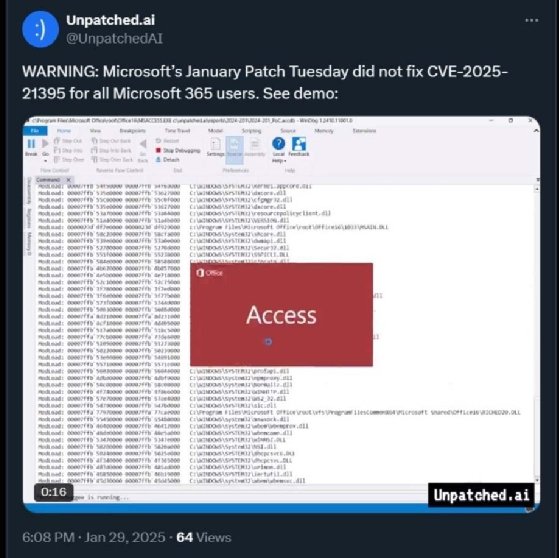
Unpatched.ai: Who runs the vulnerability discovery platform?
There is limited information on the AI-powered vulnerability discovery platform that emerged in December after it reported Microsoft vulnerabilities
During January Patch Tuesday, Microsoft credited Unpatched.ai for reporting multiple high-severity vulnerabilities, yet the AI-powered bug finding tool remains a mystery to the infosec community.
Last month, Microsoft addressed 159 new vulnerabilities that affected an array of the tech giant's widely used products. Among the flaws, Microsoft credited Unpatched.ai for discovering and reporting three remote code execution vulnerabilities, tracked as CVE-2025-21186, CVE-2025-21366 and CVE-2025-21395. All three flaws affect Microsoft Access, its database management system, and received a CVSS score of 7.8.
While Microsoft credited Unpatched.ai for the findings, there is limited information on the AI-powered analysis and vulnerability reporting tool. Informa TechTarget contacted many infosec vendors and experts, but the inquiries often led to more questions.
On its website, Unpatched.ai markets itself as "vulnerability discovery by an AI-guided, cybersecurity platform." There is a link to reported bugs, but the list solely comprises Microsoft vulnerabilities, primarily those discovered in Microsoft Access. Under the contact page, Unpatched.ai said it works with "select enterprise, government and security vendors based in the U.S. and ally countries."
Under the "about" page, Unpatched.ai attributes silent patching as one reason for its vulnerability research.
"We find unpatched issues in software to help customers better identify and manage cyber risk. Many issues are unknown or silently fixed by software vendors, hiding the true risk profile of their products. With the help of AI, we are developing an automated platform to help find and analyze these issues for our customers," Unpatched.ai wrote on the website.
In addition to the website, Unpatched.ai also has an X account. However, the platform's few posts were deleted recently. One since-deleted post, on Jan. 29, warned users that the Microsoft patch for CVE-2025-21396 was insufficient.
Informa TechTarget contacted Microsoft regarding the post. "We are aware of these reports and will take action as needed to help protect customers," a Microsoft spokesperson said.
Microsoft did not respond to requests for additional background information on Unpatched.ai.
Informa TechTarget contacted Unpatched.ai but the platform did not respond to requests for comment.

Infosec experts weigh in
A deeper dive into Unpatched.ai yielded few results, as well. The Unpatched.ai domain was registered through Namecheap in September, according to WhoIs records. Additional information about the owner, however, is shielded by a domain privacy service located in Reykjavik, Iceland.
While Adam Barnett, lead software engineer at Rapid7, said there is little information beyond what Unpatched.ai provides on the public website, he did highlight a Reddit user called "Fit_Tie_9430" who claimed to represent the platform. Last week, the user posted a link to the Jan. 29 post on Unpatched.ai's X account.
"I'd say it's likely that the Reddit user is indeed affiliated with Unpatched.ai, since that user was posting specific details of this week's [January Patch Tuesday] Access zero days a month ago (e.g., a recommendation to block specific attachment types, which is echoed in the advisories published this week," Barnett said in an email. "Everything the Reddit user has posted -- which again, isn't much --strikes me as well-written, both stylistically and in terms of understanding the technical/organizational context of working with Microsoft security issues."
In a Reddit post from December, Fit_Tie_9430 noted that much of Unpatched.ai's vulnerability discovery and analysis processes is automated. The user also provided links to a now-private YouTube channel that apparently demonstrated exploits against reported Microsoft Access vulnerabilities that affect Microsoft 365.
In addition to the three January patch Tuesday flaws Microsoft credited to Unpatched.ai, Barnett said there is one previous Microsoft advisory linked to Unpatched.ai regarding a vulnerabiity tracked as CVE-2024-49142. Barnett added that CVE-2024-49142 was originally published in December's Patch Tuesday without an acknowledgement, but Unpatched.ai was credited a couple days later. CVE-2024-49142 also affects Microsoft Access.
"The favicon for the unpatched.ai website is an emoticon :), which is an obvious riff on the Windows blue screen of death, which shares the same colours/font but with an unhappy emoticon : (. Again, this is a nice touch, but I still don't know who's behind it. It could be just about anyone who has time, resources, and skills," Barnett said.
Satnam Narang, senior staff research engineer at Tenable, also said little is known about Unpatched.ai as a service or a platform. Narang added that its now-bare X account follows only a small number of infosec professionals. "It is unclear if the service is still in a closed-door phase and will eventually provide more insights about its leadership and team, or who may be backing the service," Narang said in an email.
Alon Yamin, co-founder and CEO of Copyleaks, told Informa TechTarget that it was only a matter of time before an AI-powered vulnerability reporting platform emerged to help address an influx of vulnerabilities.
"On the one hand, the ability to proactively identify any potential vulnerabilities in code could be a game-changer for preventing cyberattacks. Early detection and rapid patching are critical to any business in today's threat environment. However, concerns about misuse are valid. As with any development in generative AI, it's crucial that Unpatched.ai is deployed carefully, responsibly, and ethically, with clear safeguards in place to prevent attackers from exploiting the vulnerabilities it identifies," Yamin said in an email.
AI-driven vulnerability discovery is a growing goal within the infosec industry, though few breakthroughs have been publicly announced. In November, Google claimed to be the first to find a zero-day vulnerability with AI technology. The company said Big Sleep, an AI-powered agent developed by Google Project Zero and Google DeepMind, uncovered a buffer stack underflow flaw in the SQLite open source database engine.
Arielle Waldman is a news writer for Informa TechTarget covering enterprise security.







